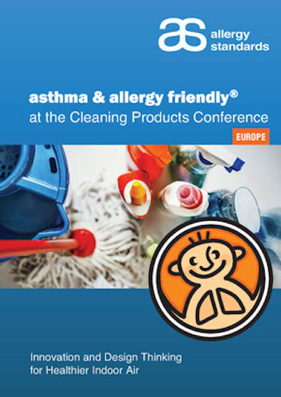 Cleanzine: your weekly cleaning and hygiene industry newsletter 10th July 2025 Issue no. 1170
Cleanzine: your weekly cleaning and hygiene industry newsletter 10th July 2025 Issue no. 1170
Your industry news - first
The original and best - for over 20 years!
We strongly recommend viewing Cleanzine full size in your web browser. Click our masthead above to visit our website version.
Dr Joey DeCourcey discusses indoor air quality at Cleaning Products Conference Europe
 This week, Allergy Standards' senior scientific officer, Dr Joey DeCourcey, is at the Cleaning Products Conference in Amsterdam, Netherlands, making a presentation on 'Allergens and the air that we breathe'.
This week, Allergy Standards' senior scientific officer, Dr Joey DeCourcey, is at the Cleaning Products Conference in Amsterdam, Netherlands, making a presentation on 'Allergens and the air that we breathe'.
Dr DeCourcey is reinforcing the importance of healthier indoor environments and giving insights into the testing process whereby cleaning products can be assessed for suitability for use in environments frequented by asthma and allergy sufferers. He is explaining how reducing exposure to inhalant indoor allergens through a multifaced approach can improve asthma control and is also advising on the best ways for manufacturers to engage with allergy-aware customers.
"In a 2014 study in five European countries, exposure to cleaning products was self-reported as an asthma trigger in 42% of patients at an average frequency occurrence of 8.2 weeks in the year," he says.
"Cleaning products and their ingredients are capable of both causing new onset asthma, and exacerbating existing conditions.
"The most common self-reported trigger was dust or dusting with 72% of participants reporting a reaction at some stage, and an average occurrence of 18.6 weeks in the year. The Guidelines for the Diagnosis and Management of Asthma coordinated by the National Heart, Lung, and Blood Institute (NHBLI) of the National Institutes of Health in the US advise a regular cleaning regime for effective pest control and reduced exposure to allergens.
"Regular cleaning to improve indoor air quality however will also increase the risk of exposure to certain chemicals used in cleaning products that may aggravate asthma and allergies. The avoidance of spray and other cleaners producing high levels of Volatile Organic Compounds (VOC) in particular is recommended in the management of asthma.
"Occupational asthma as a result of exposure to cleaning products is now a global health concern following the publication of several high-impact epidemiological studies. The first study to identify professional cleaning as a high-risk occupation was the European Community Respiratory Health Survey (ECRHS-I), an international population-based cross-sectional study carried out in 1990-95. The ECRHS-I study outlined a clear increased risk for the development of new onset asthma in cleaning workers.
"Several studies have since identified specific professional cleaning products associated with new- onset asthma including bleach, amine compounds, and Quarternary Ammonium Compound-based products. A follow up study to the ECRHS-I published in 2007 (ECRHS-II) went on to describe that using cleaning sprays at least weekly in the non-occupational setting was associated with increased asthma symptoms or medication use."
Allergy Standards (ASL) is an independent, global certification company, which creates scientific standards for testing a wide range of products and services to determine their impact on improving indoor air quality. ASL has designed a series of unique testing protocols and suitability specifications for products to achieve in order to be certified asthma & allergy friendly.
ASL's mission is to help people create the healthiest possible indoor environment through science, certification, education and innovation.
T: + 353 1 675 5678
E: [email protected]
W: www.allergystandards.com
14th March 2019







